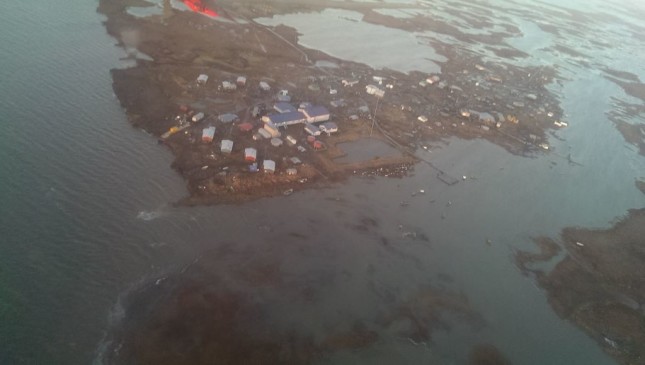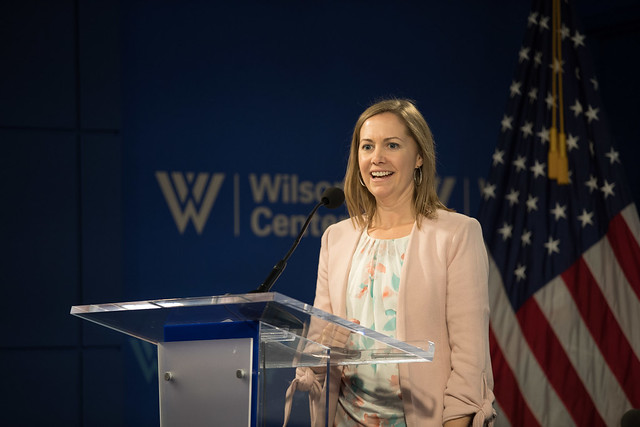-
50 Years of Water at Wilson: Rising New Ocean, Endangered Villages, Plastic Pollution (Part 2 of 2)
December 19, 2018 By Olivia Smith
In the Arctic, “a new ocean has emerged and we have to deal with it,” said Mike Sfraga, Director of the Wilson Center’s Global Risk & Resilience Program and Polar Institute at a recent water event celebrating the Wilson Center’s 50th anniversary.
Climate change has brought the ocean to the doorstep of indigenous villagers in Newtok, Alaska. “Newtok is being eaten away by a river that’s eroding because the permafrost is melting” and bombarded by storms, said Sfraga. The village is also in imminent danger of losing its water supply, and it is not alone. In Alaska, climate change is putting 32 to 36 villages in harm’s way. It will cost between $120 and $150 million to move these communities, Sfraga added. “So whether it’s Fort Lauderdale, or Fort Yukon, Alaska, it’s the same issues. Different scales, but same issues.”
In terms of natural disaster and climate change impacts, “By area, islands are the top 20 countries,” said Roger Pulwarty, Senior Scientist at the National Oceanic and Atmospheric Administration. While we may think of the Caribbean as being vulnerable to hurricanes, “the biggest risk in the region is water supply,” Pulwarty said, noting that water use during Jamaica’s tourist season is 10 times its annual rainfall. In response to these growing challenges, the region is developing innovative programs like the Caribbean Catastrophic Risk and Insurance Facility. “The idea is to pay people just enough to restart their business and their lives,” said Pulwarty.
Another ocean concern is marine life. Deirdre Warner-Kramer, Acting Deputy Director of the State Department’s Office of Marine Conservation said, the “fish don’t know where those lines are,” referring to the demarcations between countries’ exclusive economic zones. Fisheries are an international resource, which we struggle to manage. Illegal, unreported, and unregulated (IUU) fishing is a global problem. In addition, fishing vessels can be used for smuggling people, guns, drugs, and contraband. There are “direct connections between illegal fishing and terrorism and piracy,” she said.
International collaboration offers hope for our oceans. The Artic Council’s fishing moratorium, and maritime pacts like the Agreement on Port State Measures to Prevent, Deter and Eliminate Illegal, Unreported and Unregulated Fishing bring countries together to pool resources, to make fisheries sustainable, and to ensure food security for all.
“Scientists estimate that by 2050, there will be more plastic in the ocean than fish,” said Dell’s Senior Director of Global Public Policy, Rebecca Karnak. Looking toward the future, we need to think hard “about how we can be more efficient with resources and how we redefine waste,” she said. Dell is working to build the first commercial-scale global ocean-bound plastics supply chain.
Dell’s approach has been “to intercept ocean-bound plastics in areas with the highest concentration of materials,” like South Asia, said Karnak. The company started with feasibility work in Haiti and has used ocean-bound plastics in packaging and its popular products. It hopes to expand these efforts with the continued help of NGOs and other companies.
From retreating shorelines and sea-level rise to plastic pollution and endangered marine life, we are facing seas of change. The Arctic Council, the Port State Measures agreement, and private sector innovations offer ways forward but also highlight the hurdles ahead.
Read More:
- The battle over one natural resource—fish—has long been overlooked.
- Ocean warming and human activity is wreaking extensive damage on the world’s marine life.
- As the toll from natural disasters climbs higher, we need a “human security approach” to disaster planning.
- Is the world ready for the strategic challenges global warming will bring to the Arctic?
Sources: The Caribbean Catastrophe Risk Insurance Facility, Dell, Food and Agriculture Organization of the United Nations
Photo Credit: Newtok, Alaska. Photo courtesy of the Denali Commission. All rights reserved.
Topics: cooperation, environment, featured, From the Wilson Center, media, natural resources, oceans, pollution, security, video, water
 A Publication of the Stimson Center.
A Publication of the Stimson Center.




